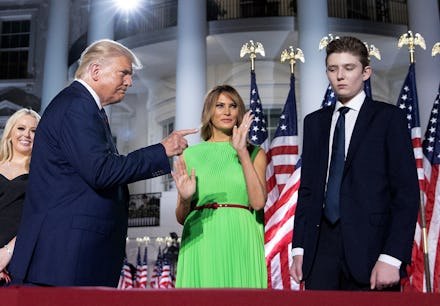Trump uses Barron's coronavirus diagnosis to push for schools to reopen

Since the beginning of summer, President Trump has pushed for schools across the United States to open for in-person learning. Now, Trump is using his youngest son's experience with coronavirus to further push his agenda. On Wednesday, Trump cited Barron's coronavirus diagnosis as proof that all schools should reopen.
Earlier this month, Trump and first lady Melania Trump confirmed they had tested positive for coronavirus. Naturally, Trump's case received a massive amount of attention, especially following his admittance into the Walter Reed medical center. But on Wednesday, Melania Trump released a statement detailing her personal experience with the virus, where she revealed that their 14-year-old son Barron had also tested positive.
In her statement, Melania Trump wrote that Barron initially tested negative for coronavirus when his parents first received their diagnoses. However, a follow-up test revealed a positive diagnosis. She wrote, "Luckily he is a strong teenager and exhibited no symptoms. ... He has since tested negative."
Following this revelation, Trump referenced his son's diagnosis at a campaign rally in Des Moines, Iowa, using a series of incorrect or racist names for the virus that has killed more than 216,000 people in America. "Barron Trump, he had the Corona-19. He had the China virus, right? And he had it for such a short period of time. I don't think he even knew he had it because they're young and their immune systems are strong and they fight it off 99.9%. And Barron is beautiful, and he's free, free."
The Hill reported that Barron attends St Andrew's Episcopal School, a private school in the Washington, D.C., area that has had all-virtual classes this year. So, Trump went on to add, "It happens. People have it, and it goes. Get the kids back to school. We've got to get them back to school."
While Trump pushes for schools to reopen, there's plenty of evidence that says it's better to keep them closed. In the past, Trump has mentioned that kids being younger means they're less susceptible to the coronavirus, and it's a notion that he and the first lady are playing up with their own son. Sure, it's true that children tend to exhibit either no or milder symptoms than adults, and severe complications are less common. But last month, a study by the Centers for Disease Control and Prevention confirmed that kids can still spread coronavirus.
In August, Georgia's largest school district had to deal with its own coronavirus disaster after 260 employees tested positive or were exposed to coronavirus. In another case, a second-grader tested positive for the virus after the first day of school, resulting in the entire class having to quarantine.
Similar to how he invokes Barron's experience, Trump touts his own coronavirus case as proof that it isn't that bad. He told the crowd, "It's a little tough. You have a temperature and you don't feel good." However, Trump continues to ignore one basic fact that drastically shapes his experiences with health care: He's the president.
This means Trump and his family have access to medical care that many others do not. As Lakshman Swamy, an ICU physician at Cambridge Health Alliance in Massachusetts, told Stat News, "COVID is all about privilege. The more privilege you have, the more you can ignore some of the rules of COVID. Where one person would need to be in the hospital, another person can have the hospital come to them. That’s privilege."
Trump's refusal to acknowledge that is particularly glaring after a July study found that when 5.4 million people lost their jobs between February and May, the U.S. saw the biggest increase of uninsured people on record. And under the Trump administration, the number of uninsured children has risen each year, jumping to 5.7% in 2019.
It's easy for Trump to call for schools to reopen because, at the end of the day, he doesn't have to worry about affording medical care. If Barron had begun to exhibit even mild symptoms, it's likely that he would have had immediate access to a world-class doctor. He wouldn't have the experience of, for example, the 17-year-old who died after being denied care for coronavirus symptoms because he was uninsured.